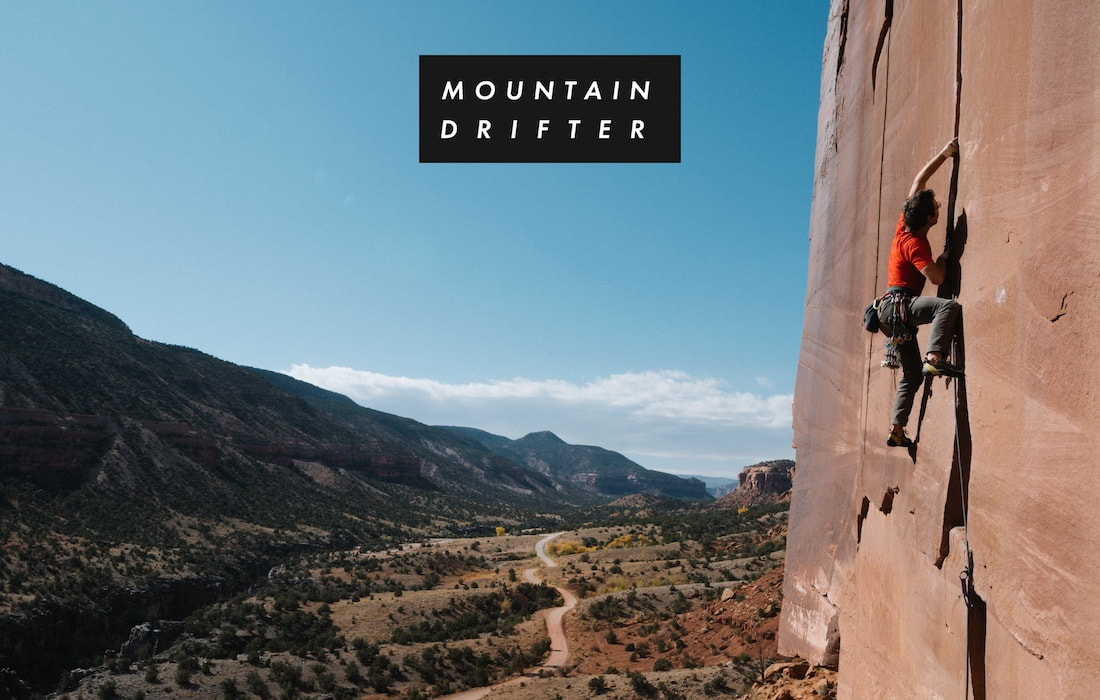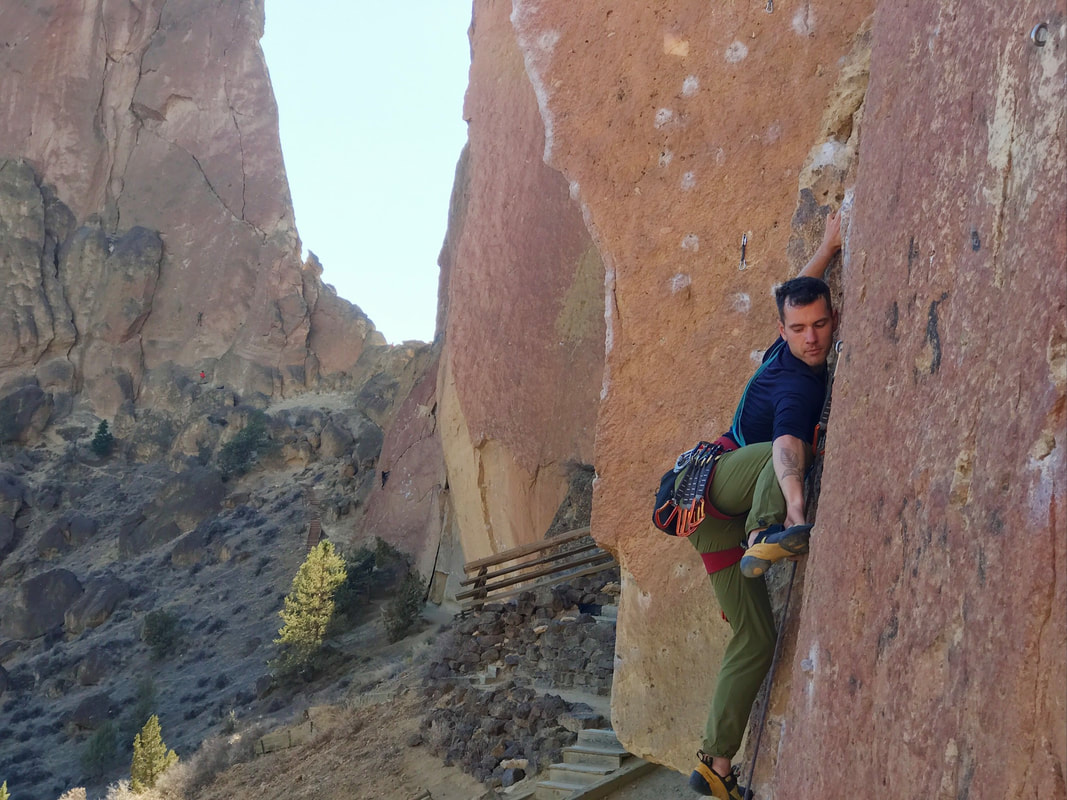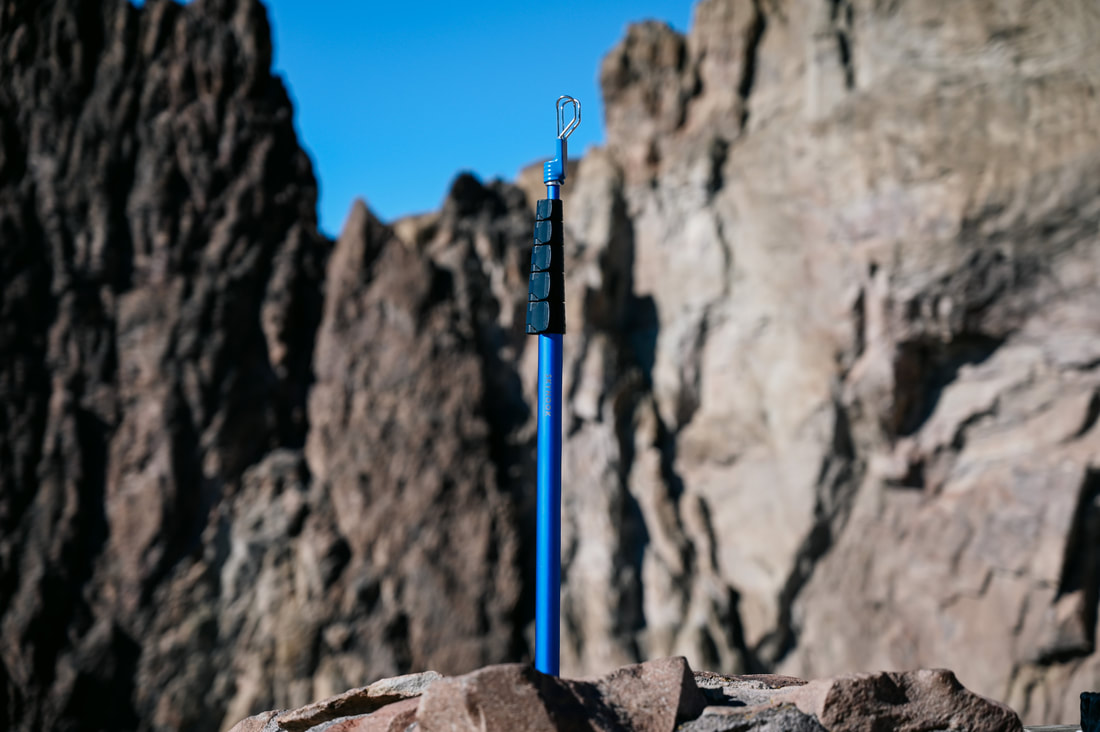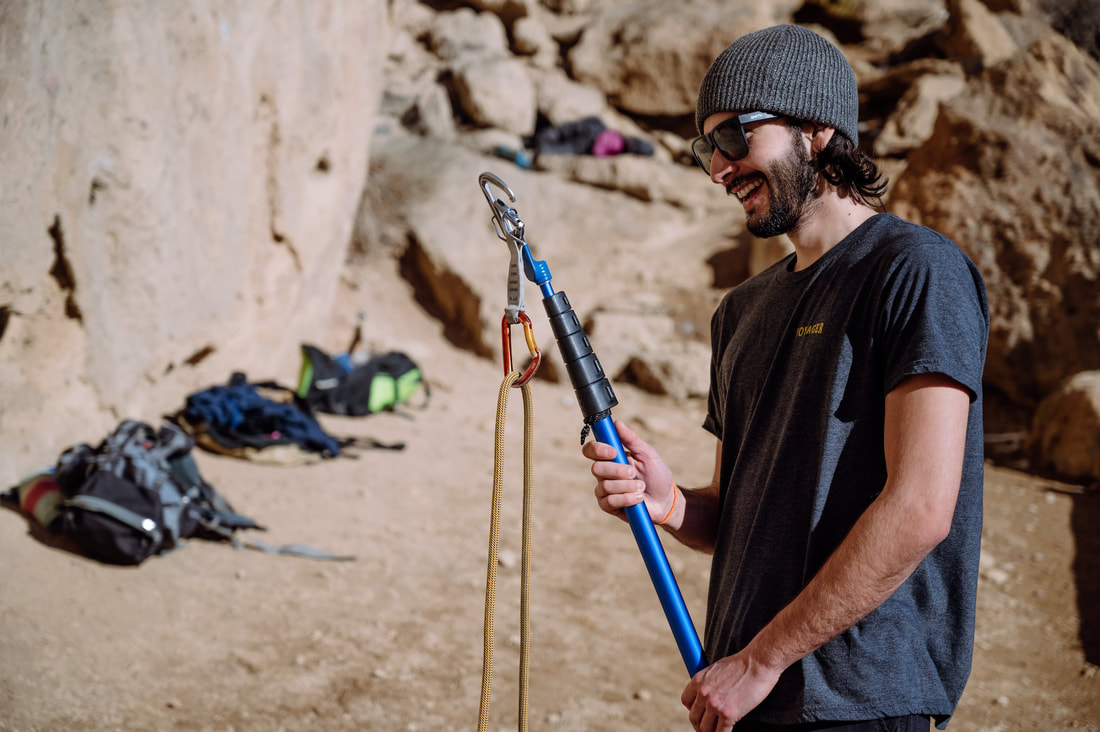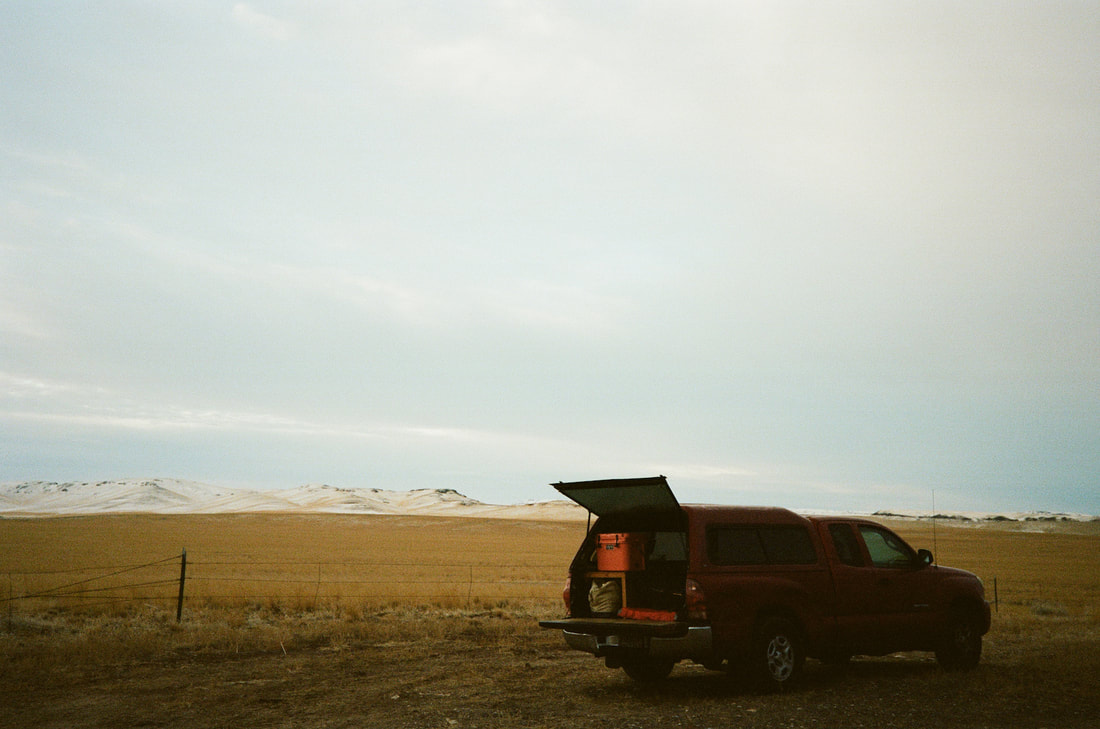Common Climber Marketplace is highlights small climbing-related businesses to help spread the word about their work and to help our community thrive.
Here we interview Quinn Rohlf the creator of the SkyHook and owner of the parent company Mountain Drifter LLC. Also, check out the Common Climber review of the SkyHook stick clip.
|
Tell us about your business Mountain Drifter and what you envision for it.
What I want to do with Mountain Drifter is build niche products that the bigger climbing businesses aren't going to. Now that climbing has gotten so big, there's a lot of money to be made in things with wide appeal like apparel and footwear - everybody wants a puffy jacket. But for the low-volume, specialized stuff, there aren't a lot of options out there right now. That's where I think a big opportunity exists for a company that's willing to embrace the more niche aspects of our sport. Your first product is the SkyHook stick clip. How did that come about?
I had never actually owned a stick clip before the Skyhook, because all the existing options out there seemed like compromises. I don't like hiking with my hands full so the super long ones weren't good, the existing compact options were pretty flimsy, and just overall I didn't really feel like any of them were worth the money. The problem was that I climbed a lot at Smith Rock and other spots that have some very committing first bolts. |
|
I've got an engineering background, and have done plenty of fabrication & machining (my nerdy secret is that I used to build competition robots back in high school), so I decided to make a better stick clip. After tinkering a little bit, I found a company in China that specializes in lightweight extension poles, and we did several rounds of prototypes together in order to figure out the right combination of length, segment count, material, tubing diameter, and joint design, and then I personally did the computer modeling for the threaded attachment on the end that the end piece screws on to.
Fortunately, I didn't have to invent a new stick clip head, since the Superclip attachment is a brilliant little piece of engineering, and they're made in the USA just a few hours from Bend down in northern California. I was able to call them up and get a partnership going so that we could include a genuine Superclip with each one of the Skyhook poles that we sell. |
What was it like working with an overseas company?
It's a little bit of a double-edged sword. This project wouldn't have happened without the help I got from our overseas partner - literally all they do is make every type of extension pole imaginable, all day, every day. So they were extremely well equipped to help with the design phase, and their manufacturing line was set up to accommodate small, custom orders like mine without a months-long tooling-up process. US shops just aren't set up to handle low-volume, full-custom work like this in any kind of cost-effective fashion.
The biggest obstacle was communication, of course. I had originally planned to fly to China to work with the company (and also try to do some climbing on the side!) but unfortunately COVID canceled those plans so we wound up doing the entire design process over email and chat. Doing mechanical design work is always so much harder remotely - there's a lot of value in being able to just point at things or bring a model into the conversation, which isn't possible over written communication.
Also, there was a 3+ week delay any time I was ready to look at a prototype, since they had to mail it from China to the US. Combined with the time zone differences and language barrier challenges, this was really the biggest reason why the project had so many delays - I'd guess that if I'd been able to be physically on location for the design phase, we would have shipped the production models about four to six months ahead of when we ultimately wound up shipping.
It's a little bit of a double-edged sword. This project wouldn't have happened without the help I got from our overseas partner - literally all they do is make every type of extension pole imaginable, all day, every day. So they were extremely well equipped to help with the design phase, and their manufacturing line was set up to accommodate small, custom orders like mine without a months-long tooling-up process. US shops just aren't set up to handle low-volume, full-custom work like this in any kind of cost-effective fashion.
The biggest obstacle was communication, of course. I had originally planned to fly to China to work with the company (and also try to do some climbing on the side!) but unfortunately COVID canceled those plans so we wound up doing the entire design process over email and chat. Doing mechanical design work is always so much harder remotely - there's a lot of value in being able to just point at things or bring a model into the conversation, which isn't possible over written communication.
Also, there was a 3+ week delay any time I was ready to look at a prototype, since they had to mail it from China to the US. Combined with the time zone differences and language barrier challenges, this was really the biggest reason why the project had so many delays - I'd guess that if I'd been able to be physically on location for the design phase, we would have shipped the production models about four to six months ahead of when we ultimately wound up shipping.
What was it like doing the Kickstarter? Are you happy with the outcome? Any tips for people considering doing one to raise funds for an idea?
Kickstarter is a whole different world and even now, I'm not entirely sure I completely understand it. There are a lot of very well-funded, well-produced campaigns on Kickstarter that have obviously poured ten to twenty thousand dollars into product development and slick marketing before they even came to Kickstarter. The "two people in a garage" products do exist on the platform, but these days all of those "raised a million dollars on Kickstarter" success stories you hear about pretty much begin with a pre-existing company and quite a lot of cash already invested.
I was really happy about the Kickstarter because all I wanted was to learn whether people thought the product was a good value at the price we picked, and to raise enough money to fund our initial production run. I didn't spend a cent on marketing for the Kickstarter, and from word of mouth alone we were able to raise about ten thousand dollars in the first week.
If anyone reading this is thinking about doing a Kickstarter, my advice would be to have a really intentional goal. If what you're looking for is fundraising, there are probably easier avenues to pursue - on Kickstarter, you're competing with some serious heavyweights that have already sunk substantial money into their campaigns. If what you're looking for is validation that there's a market for your idea, then I think Kickstarter is a great way to prove that out!
Can people order the SkyHook now or buy it in a retail store?
Yes! You can order a Skyhook online at https://mountaindrifter.com/, and we're also stocked in four independent climbing shops: Mountain Supply (Bend, OR), Redpoint Climbers Supply (Terrebonne, OR), Wild Iris Mountain Sports (Lander, WY), and Spire Climbing + Fitness (Bozeman, MT).
We also plan to add our first Canadian retail partner in early 2022, people can keep an eye on our website and social media for that announcement!
Yes! You can order a Skyhook online at https://mountaindrifter.com/, and we're also stocked in four independent climbing shops: Mountain Supply (Bend, OR), Redpoint Climbers Supply (Terrebonne, OR), Wild Iris Mountain Sports (Lander, WY), and Spire Climbing + Fitness (Bozeman, MT).
We also plan to add our first Canadian retail partner in early 2022, people can keep an eye on our website and social media for that announcement!
How has the retail distribution experience been for you?
Overall, it's been great. I really value being able to go and see a piece of gear in person - it's impossible to replace the experience of actually holding a product in your hands. For stick clips specifically, I think a lot of people don't realize that they need one until they end up at a crag like Smith, so being stocked at independent climbing shops like Redpoint means that folks who might be on a road trip have access to our product right when they need it and are going to see the most use out of it.
Overall, it's been great. I really value being able to go and see a piece of gear in person - it's impossible to replace the experience of actually holding a product in your hands. For stick clips specifically, I think a lot of people don't realize that they need one until they end up at a crag like Smith, so being stocked at independent climbing shops like Redpoint means that folks who might be on a road trip have access to our product right when they need it and are going to see the most use out of it.
What's it like for you to own your own business?
I had previously been doing software engineering remotely, which is honestly a pretty cushy gig for a rock climber. I never expected or planned to be a business owner. But these days, it's difficult to find an industry job that feels ethical that also gives you enough freedom and work-life balance to pursue your own passions. While the first few months of Mountain Drifter have definitely skewed towards work, I think that in the long-term doing my own thing is going to be a way more sustainable path for me than punching the clock.
I had previously been doing software engineering remotely, which is honestly a pretty cushy gig for a rock climber. I never expected or planned to be a business owner. But these days, it's difficult to find an industry job that feels ethical that also gives you enough freedom and work-life balance to pursue your own passions. While the first few months of Mountain Drifter have definitely skewed towards work, I think that in the long-term doing my own thing is going to be a way more sustainable path for me than punching the clock.
Have you received any mentoring on how to start, own, and run a business?
Yes! I want to give a huge shout out to Justin Brown who owns the climbing skincare company Rhino Skin. As the owner of an established small company in the climbing industry that's also based in Central Oregon, some of the early conversations I had with him were really helpful in shaping how I chose to go about starting up my business.
The Bend Outdoor Worx mentor network was also hugely helpful in connecting me with people who have stood in my shoes before and understood a lot of the unique challenges associated with getting started as a product company in the outdoor space.
Yes! I want to give a huge shout out to Justin Brown who owns the climbing skincare company Rhino Skin. As the owner of an established small company in the climbing industry that's also based in Central Oregon, some of the early conversations I had with him were really helpful in shaping how I chose to go about starting up my business.
The Bend Outdoor Worx mentor network was also hugely helpful in connecting me with people who have stood in my shoes before and understood a lot of the unique challenges associated with getting started as a product company in the outdoor space.
Where do things stand now and in the future for you and Mountain Drifter LLC?
In the past month I've been able to finally stabilize our production so that we aren't running out of stock any more, and I think we're going to see steady growth in terms of demand for the Skyhook stick clip. Now that things are running smoothly on that side of the operation, I have some free time that I'm spending on trying to get the Skyhook stocked in more places, as well as doing a little bit of R&D on some new product ideas!
In the past month I've been able to finally stabilize our production so that we aren't running out of stock any more, and I think we're going to see steady growth in terms of demand for the Skyhook stick clip. Now that things are running smoothly on that side of the operation, I have some free time that I'm spending on trying to get the Skyhook stocked in more places, as well as doing a little bit of R&D on some new product ideas!

